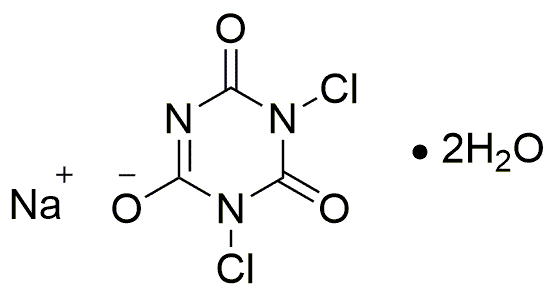Sodium dichloroisocyanurate dihydrate is widely utilized in research focused on:
- Water Treatment: This compound is commonly used as a disinfectant in swimming pools and drinking water systems, effectively eliminating harmful bacteria and viruses.
- Food Safety: It serves as a sanitizer in food processing and preparation areas, ensuring that surfaces and equipment are free from pathogens, thus enhancing food safety.
- Laboratory Applications: In research laboratories, it is employed for sterilizing equipment and surfaces, providing a reliable method to maintain a contamination-free environment.
- Textile Industry: The compound is used in the textile industry for bleaching and disinfecting fabrics, improving the quality and safety of textile products.
- Agricultural Use: It is applied in agriculture for sanitizing irrigation systems and equipment, helping to prevent the spread of diseases among crops.
General Information
Properties
Safety and Regulations
Applications
Sodium dichloroisocyanurate dihydrate is widely utilized in research focused on:
- Water Treatment: This compound is commonly used as a disinfectant in swimming pools and drinking water systems, effectively eliminating harmful bacteria and viruses.
- Food Safety: It serves as a sanitizer in food processing and preparation areas, ensuring that surfaces and equipment are free from pathogens, thus enhancing food safety.
- Laboratory Applications: In research laboratories, it is employed for sterilizing equipment and surfaces, providing a reliable method to maintain a contamination-free environment.
- Textile Industry: The compound is used in the textile industry for bleaching and disinfecting fabrics, improving the quality and safety of textile products.
- Agricultural Use: It is applied in agriculture for sanitizing irrigation systems and equipment, helping to prevent the spread of diseases among crops.
Documents
Safety Data Sheets (SDS)
The SDS provides comprehensive safety information on handling, storage, and disposal of the product.
Product Specification (PS)
The PS provides a comprehensive breakdown of the product’s properties, including chemical composition, physical state, purity, and storage requirements. It also details acceptable quality ranges and the product's intended applications.
Certificates of Analysis (COA)
Search for Certificates of Analysis (COA) by entering the products Lot Number. Lot and Batch Numbers can be found on a product’s label following the words ‘Lot’ or ‘Batch’.
Numéro de catalogue
Numéro de lot/série
Certificates Of Origin (COO)
This COO confirms the country where the product was manufactured, and also details the materials and components used in it and whether it is derived from natural, synthetic, or other specific sources. This certificate may be required for customs, trade, and regulatory compliance.
Numéro de catalogue
Numéro de lot/série
Safety Data Sheets (SDS)
The SDS provides comprehensive safety information on handling, storage, and disposal of the product.
DownloadProduct Specification (PS)
The PS provides a comprehensive breakdown of the product’s properties, including chemical composition, physical state, purity, and storage requirements. It also details acceptable quality ranges and the product's intended applications.
DownloadCertificates of Analysis (COA)
Search for Certificates of Analysis (COA) by entering the products Lot Number. Lot and Batch Numbers can be found on a product’s label following the words ‘Lot’ or ‘Batch’.
Numéro de catalogue
Numéro de lot/série
Certificates Of Origin (COO)
This COO confirms the country where the product was manufactured, and also details the materials and components used in it and whether it is derived from natural, synthetic, or other specific sources. This certificate may be required for customs, trade, and regulatory compliance.


